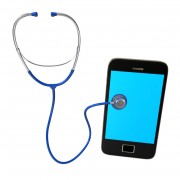Will smartphones help diagnose Zika?
The ubiquitous devices might facilitate the diagnosis of the mosquito-borne disease in areas without basic medical infrastructure

Researchers are working on a new way to rapidly and accurately diagnose the Zika virus using mobile health technology that could potentially be deployed in resource-limited parts of the world.
The tool, being developed by a team at Harvard Medical School’s Brigham and Women’s Hospital, could also provide a home test for couples who are trying to conceive in locations with a high risk of infection.
According to the scientists, the test will adapt advances in digital health systems and nanotechnology to transform a smartphone into a device capable of detecting Zika.
"Zika diagnostics represent an urgent need in many parts of the world. Our goal is to address this unmet clinical need using cell-phone-based technology," wrote corresponding author Dr Hadi Shafiee in ACS Nano.
"Cell phones have the power to perform complicated analyses, handle image processing, take high quality images, and are ubiquitous in Zika-afflicted countries. We can leverage this to address outbreaks of infectious disease."
Zika, which continues to cause microcephaly and other neurological complications in infants whose mothers were infected during pregnancy, remains a public health concern after it came to prominence at the time of the Rio de Janeiro Olympic Games.
Traditional diagnostics rely on detecting antibodies in a person's bloodstream that target Zika. However, many closely related viruses, including dengue, can elicit similar antibodies, leading to a high false positive rate for such tests. Other research groups are currently developing methods to go after the nucleic acid building blocks of the Zika virus, but Shafiee and colleagues have taken an entirely new approach by developing a way to detect intact copies of the virus itself.
To do so, the team is using nanotechnology. Researchers developed tiny platinum nanomotors that target Zika, and microbeads that bind the virus. When both components are added to a sample containing Zika, they form a three-dimensional complex that moves in the presence of hydrogen peroxide. This movement can be detected using a smartphone hooked up to a $5 optical device.
The technology can differentiate between the Zika virus and other closely related viruses through the uniqueness of motion signal. The three-dimensional Zika complex moves rapidly while other non-target viruses will cause slower motion that can be easily excluded by the cellphone system for very specific detection. This motion mechanism overcomes the cross reactivity in antibody-based detection and the complexity of nucleic acid-based detections.
This approach, known as the nanomotor-based bead-motion cellphone (NBC) system, detected Zika in samples with viral concentrations as low as one particle per microlitre. The team also reports that the NBC system was highly specific, and in the presence of other viruses, it accurately detected Zika.
"The NBC system has the potential to be used at the point of care for disease detection in both developed and developing countries," said lead author Dr Mohamed Shehata Draz. "This is an important way to eliminate the social stress related to Zika virus infection and health problems specifically related to newborns."
Related Articles
VR could be a boon for anxiety disorder patients
The technology might help patients ease their anxiety by providing exposure to computer-generated frightening environments
Read moreThe battle against ageing
Is a breakthrough that will give us more healthy years on the horizon?
Read moreTelemedicine app begins trial at NHS clinic
The application will allow patients to do video consultation with doctors and pay by using its own cryptocurrency
Read moreLatest Articles
Medical Care
Clinical Exercise Physiologist (CEP): The Emerging of Exercise is Medicine
How Exercising can be a Medicine
Read moreMedical Care
Reversing type 2 Diabetes: Embracing Hope and Determination
Experience the remarkable journey of Ash and his grandfather Atok as they conquer type 2 diabetes through unconventional methods, showcasing the power of love and determination over adversity.
Read moreMedical Care
Bladder Cancer: What You Need to Know
Empower yourself with our comprehensive guide to bladder cancer. Explore symptoms, diagnosis, treatments, and supportive resources to safeguard your health.
Read more